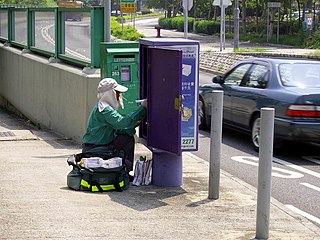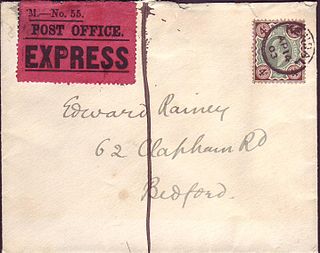An international reply coupon (IRC) is a coupon that can be exchanged for one or more postage stamps representing the minimum postage for an unregistered priority airmail letter of up to twenty grams sent to another Universal Postal Union (UPU) member country. IRCs are accepted by all UPU member countries.

Communications in Somalia encompasses the communications services and capacity of Somalia. Telecommunications, internet, radio, print, television and postal services in the nation are largely concentrated in the private sector. Several of the telecom firms have begun expanding their activities abroad. The federal government operates two official radio and television networks, which exist alongside a number of private and foreign stations. Print media in the country is also progressively giving way to news radio stations and online portals, as internet connectivity and access increases. In 2012, a National Communications Act was also approved by Cabinet members, and 2 October 2017, the president of Somalia Finally signed the National Communications Law, and became the official Law that regulated the ICT industry. Under that Law, National Communications Authority (NCA) of the federal Republic of Somalia has been established, with board of directors and a general manager. Somalia currently is ranked first in Africa for most affordable mobile data per gigabyte and 7th in the world.
The Universal Postal Union is a specialized agency of the United Nations (UN) that coordinates postal policies among member nations and facilitates a uniform worldwide postal system. It comprises 192 member states and is headquartered in Bern, Switzerland.

The mail or post is a system for physically transporting postcards, letters, and parcels. A postal service can be private or public, though many governments place restrictions on private systems. Since the mid-19th century, national postal systems have generally been established as a government monopoly, with a fee on the article prepaid. Proof of payment is usually in the form of an adhesive postage stamp, but a postage meter is also used for bulk mailing.
Franking comprises all devices, markings, or combinations thereof ("franks") applied to mails of any class which qualifies them to be postally serviced. Types of franks include uncanceled and precanceled postage stamps, impressions applied via postage meter, official use "Penalty" franks, Business Reply Mail (BRM), and other permit Imprints (Indicia), manuscript and facsimile "franking privilege" signatures, "soldier's mail" markings, and any other forms authorized by the 192 postal administrations that are members of the Universal Postal Union.

Express mail is an expedited mail delivery service for which the customer pays a premium for faster delivery. Express mail is a service for domestic and international mail, and is in most nations governed by the country's own postal administration. Since 1999, the international express delivery services are governed by the EMS Cooperative.

Parcel post is a postal service for mail that is too heavy for normal letter post. It is usually slower than letter post. The development of the parcel post is closely connected with the development of the railway network which enabled parcels to be carried in bulk, to a regular schedule and at economic prices. Today, many parcels also travel by road and international shipments may travel by sea or airmail.

The United Nations Postal Administration (UNPA) is the postal agency of the United Nations. It issues postage stamps and postal stationery, denominated in United States dollars for the office in New York, in Swiss francs for the office in Geneva and in euros for the office in Vienna. As such, UNPA is the only postal authority that issues stamps in three different currencies.
The Treaty of Bern, signed on 9 October 1874, established the General Postal Union, which is today known as the Universal Postal Union. Named for the Swiss city of Bern, where it was signed, the treaty was the result of an international conference convened by the Swiss Government on 15 September 1874. It was attended by representatives of 22 nations. Plans for the conference had been drawn up by Heinrich von Stephan, Postmaster-General of the German Reichspost who demanded from the neutral Switzerland the organization of an International Postal Congress following the end of the French-German war of 1870–1871.
A Digital Postmark (DPM) is a technology that applies a trusted time stamp issued by a postal operator to an electronic document, validates electronic signatures, and stores and archives all non-repudiation data needed to support a potential court challenge. It guarantees the certainty of date and time of the postmarking. This global standard was renamed the Electronic Postal Certification Mark (EPCM) in 2007 shortly after a new iteration of the technology was developed by Microsoft and Poste Italiane. The key addition to the traditional postmarking technology was integrity of the electronically postmarked item, meaning any kind of falsification and tampering will be easily and definitely detected.

The Postal Union Congress is the main international meeting of the Universal Postal Union, used to discuss various issues affecting international postal services, such as legislation, the political climate, and other strategic issues. The first congress was held in Bern, Switzerland in 1874, and was attended by delegates from 22 countries, most of them European. The meetings are normally held every four years, although they were cancelled during the two World Wars. Extraordinary Meetings can also be called outside the four-year cycle.

The first postage stamps of Bhutan were issued in 1962, the same year that the first motorable road was opened. Before that there was a mail delivery system in place for official mail using mail runners, and between 1955 and 1962 revenue stamps were accepted as payment for internal mail. With the opening up of Bhutan in the early 1960s, a formal postal system was introduced.

The story of Japan's postal system with its postage stamps and related postal history goes back centuries. The country's first modern postal service got started in 1871, with mail professionally travelling between Kyoto and Tokyo as well as the latter city and Osaka. This took place in the midst of the rapid industrialization and social reorganization that the Meiji period symbolized in Japanese history. Given how the nation's railroad technology was in its infancy, Japan's growing postal system relied heavily on human-powered transport, including rickshaws, as well as horse-drawn methods of delivery. For example, while commemorating the 50th anniversary of Japan's postal service, the country's 1921 government released decorative postcards depicting intrepid horseback riders carrying the mail. This however was done to compare postal transport in past and present, as the other card showed modern transportation viz. rail and shipping. The railroad net from the north to the south, Aomori to Nagasaki, was completed in 1889. Prior to 1920s, local delivery was mainly by men- and horsepower, not principally different to Europe.

The National Post Office is the company responsible for the postal service in Rwanda. As of 2009, the Director General of National Post Office was Celestin Kayitare.
The Barbados Postal Service (B.P.S.) is the national postal operator of Barbados and operates as a department within the Government of Barbados where it reports to the Ministry of Home Affairs. The Barbados Postal Service (B.P.S.) is headed by the acting Postmaster General, Sheila Greaves, who is responsible for maintaining the island’s postal services, subject to the laws of the island. In 1852, the Postal services for Barbados were reconstituted following the passage of local legislation enabling the delivery of inland postage.

A cecogram, also known as literature for the blind, is a letter or a parcel that contains documents or items intended for visually impaired persons. Cecograms can be sent or received by such persons, as well as by organisations that provide assistance to the visually impaired. Cecograms are either partially or entirely exempt from postage.










